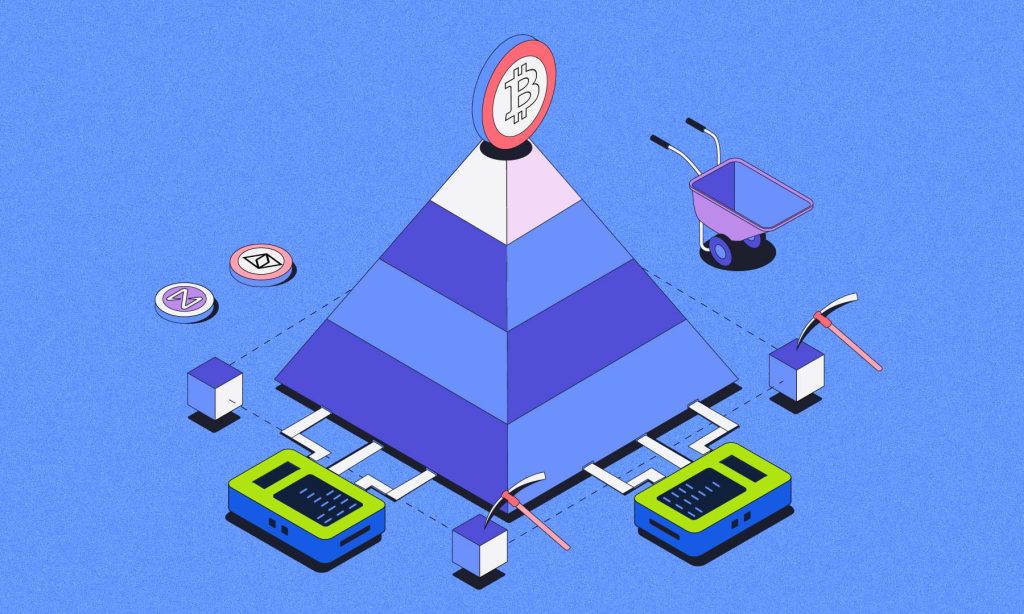The concept of a crypto mining pool in blockchain proves the power of staying united. Mining pools are groups of individuals who collaborate to combine their computing power. The combined computing power helps them mine more efficiently and distribute a share of the rewards. Yet, there is a concern that such groups could threaten the decentralized nature of the blockchain network. In this article, we discuss the pros and cons of crypto mining pools and how it impacts the overall blockchain ecosystem.
Understanding mining pools and centralization
Mining pools are significant in the crypto ecosystem because they provide a more efficient way to mine cryptos, particularly for small-scale miners. Novices may have limited mining rig resources and restricted access to electricity. By pooling computing power, miners can earn consistent rewards and reduce the variance in their earnings. One needs extensive computing power to mine new coins in saturated crypto flavors such as Bitcoin, which has a limited supply.
What is a mining pool?
Mining pools are groups of miners who combine their computing power to mine more efficiently and earn a share of the rewards. For the uninitiated, such mining pools are akin to sporting teams, which often compete against each other for rewards.
How mining pools work
Generally, individuals prefer to join clubs or pools where a network splits their computing power and rewards individuals appropriately. The pool’s operator manages the mining process and distributes rewards proportionally to participants. For a deeper understanding of how mining pools work, read this CoinSwitch article.
What is mining centralization?
Mining pools can contribute to the centralization of mining because they concentrate mining power in the hands of a few large mining pools. The concentration can potentially threaten the decentralization of the blockchain network. It would also give a free hand to mining pool operators to engage in malicious activities such as double-spending attacks or 51% attacks. However, one can lessen centralization risks by promoting decentralized mining pools and encouraging miners to participate in smaller pools.
Different types of mining centralization
There are two main types of mining pools – centralized and decentralized. Centralized pools are operated by a single organization or company to control the mining process and distribute rewards among participants. They are common among networks and are energy efficient. A network of participants operates decentralized mining pools without a central authority. They use smart contracts to manage the mining process and distribute the rewards. Decentralized mining pools are less common and generally less efficient than centralized pools.
Impact of mining pools on crypto network security
Mining pools are significant in the blockchain ecosystem because they provide a more efficient way to mine cryptos, particularly for small-scale miners. On the flip side, though, mining pools can also contribute to the centralization of mining, potentially threatening the crypto network’s decentralization. Mining pools can have positive and negative effects from a security, decentralization, and fairness perspective.
How mining pools affect the decentralization of a crypto network
By concentrating mining power in the hands of a few large pools, mining pools can contribute to the centralization of mining. However, mining pools can also contribute to decentralization by allowing small-scale miners to participate in the mining
How mining pools affect the security of a cryptocurrency network
Mining pools can potentially threaten the security of blockchain networks by concentrating mining power in the hands of a few large pools. This makes it easier for a malicious actor to launch an attack where they would seize control (more than 50%) of the network’s mining power. However, this is difficult, as good networks have sufficient security measures to thwart such attacks.
How mining pools affect the fairness of mining rewards distribution
Mining pools can impact the fairness of mining rewards distribution. In centralized mining pools, the pool operator controls the mining process and distributes the rewards to the participants. This can lead to concerns about fairness and transparency in reward distribution. Decentralized mining pools use smart contracts to manage the mining process and distribute rewards automatically. This can potentially increase transparency and fairness in reward distribution.
Impact of mining centralization on the crypto market
Believe it or not, mining pools can make or break a crypto network. If left uncontrolled, they can damage the smooth functioning of cryptos. But on the positive side, there are abundant benefits from mining pools. Here are some of those characteristics.
How mining centralization affects the value and stability of a specific crypto
Mining centralization can hurt the value and stability of cryptos by creating a risk of 51% attacks. When a few large mining pools control mining power, it becomes easier for a single entity to control the network and manipulate the blockchain. In fact, centralization can undermine trust in the crypto market and reduce its value and stability.
How mining centralization affects the adoption and acceptance of a specific crypto
Mining centralization can also impact the adoption and acceptance of cryptos. When mining power is concentrated, it can create a perception that a small group of individuals or entities controls the crypto network. This can impact the adoption and acceptance of the specific crypto.
How mining centralization affects competition among miners and mining pools
Mining centralization can also impact healthy competition among mining pools. The concentration of mining power can create entry barriers for individuals or other smaller mining pools. Monopoly in mining significantly reduces competition and innovation in the mining industry. Such practices can negatively impact the efficiency and effectiveness of the mining process.
Conclusion
In conclusion, mining centralization can significantly impact the value and stability of crypto assets, and their adoption and acceptance. Mining centralization can create risks of 51% attack and reduce trust in the crypto asset. But it can also create barriers to entry and reduce competition in the mining industry. It is essential to balance between the benefits and risks of mining centralization to ensure the long-term success and sustainability of cryptos.








